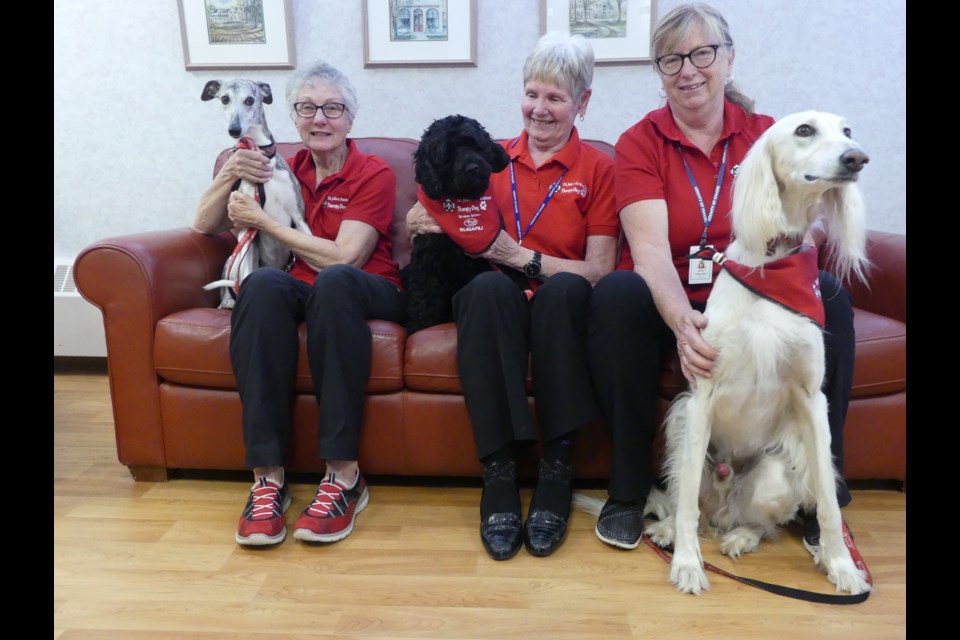Janice Preiss’ grandfather was not happy about having to move into a hospice.
“He was angry, and he wouldn’t talk to any of us,” she said.
It was 1984 and Preiss had recently heard about the idea of therapy dogs, so she decided to give it a shot.
Bringing her dog with her the next time she visited, her grandfather’s demeanor immediately changed. He was still reluctant to engage with people, but he was able to share his feelings with Preiss’ saluki.
“It got a response. He would only talk to the dog,” she said, noting he even requested the dog’s presence for important meetings with his priest.
The experience inspired Preiss to continue using her dog as a therapy dog, aiming to bring comfort and joy to seniors in long-term care homes in the South Simcoe area.
At first, she did it on her own with a small army of helpers and volunteers.
“It was very informal,” she said, adding she used to also bring farm animals she borrowed from the Henderson family. “The ducks would be running around. People loved it.
“One day, I had a pygmy goat. It had climbed on my lap (while I was driving to the nursing home). The police pulled me over for a RIDE program, and the police officer said, ‘I’m not even going to ask.’”
After 15 years of volunteering her time, Preiss joined St. John Ambulance’s therapy dog program and has now been with the organization for 15 years, visiting care homes in Simcoe County and York Region.
Preiss, who is the therapy dog unit co-ordinator for St. John Ambulance Barrie-Simcoe-Muskoka, has recently shifted more toward Simcoe County, visiting with her 10 year old saluki named Vinnie.
While the organization’s mandate is to visit nursing homes, Preiss and other therapy dog owners also visit local schools.
“People are happy to see the dogs. We’re just the people on the end of the leash,” she said.
Currently, there are 25 members with 27 dogs participating in the Simcoe program, which runs from Angus, to Bradford, to Barrie.
Volunteers must commit to 60 hours a year — with visits typically lasting about an hour each — plus attend some events such as parades and a cadet camp at CFB Borden.
Anyone in Simcoe County who is interested in participating must first meet with Preiss to see whether their dog is a good match before moving forward.
During a recent stop at Simcoe Manor in Beeton, Preiss sat with other therapy dog owners in the lobby, as residents, their visitors, and staff members flocked around them, giving the dogs pats and hugs.
“It’s just wonderful. I just love them,” said Simcoe Manor resident Marilyn, who declined to give her last name. “You don’t think about anything else. All you think about is giving them love.”
Frank Friesen’s wife, Pat, has lived at Simcoe Manor for six years and always loved seeing the therapy dogs.
“She liked petting them and whatnot,” he said. “I think they’re fabulous for the residents. It’s good therapy for them. Personally, I really believe they have a real purpose for giving the residents a lift.”
A lot of residents in places like Simcoe Manor are former farmers who used to own dogs, so the visits are particularly popular with them, said Kathy Fleming, who has been volunteering with the program for 17 years. She currently visits with her six year old whippet named Byron.
She started after taking her dog to an obedience class and being told he might be suited for retirement home visits.
Later, her husband, Michael Barson, had aggressive dementia and lived at a retirement home.
Their dog at the time “calmed him down,” she said. “It was good — definitely a relief.”
Barb Bottrell is a relatively new volunteer with her three year old cockapoo, Wilson, but she said she knew since he was a puppy she wanted to make him a therapy dog.
After her mother in law had a stroke, Bottrell visited her in a long-term care home when Wilson was just 10 weeks old.
“She would smile. You could hear the gurgle in her laugh,” Bottrell said. “I decided one day I’m going to see about (having) a therapy dog. I saw the difference."
Therapy dogs do not need to undergo extensive obedience training to be accepted into the program, Preiss said, noting they just need to be well behaved, friendly, and like people.
Dog owners are required to complete a criminal background check, attend an orientation in Barrie, and complete a test with their dog. An experienced volunteer will also join them on their first several visits.
“It’s a great bunch of people because they love people and they love dogs,” Preiss said.
“The joy you get from seeing the look on people’s face — it’s just heartwarming,” added Fleming.
Anyone who wants more information about the St. John Ambulance therapy dog program can contact Janice Preiss at 905-729-3198 or [email protected].



